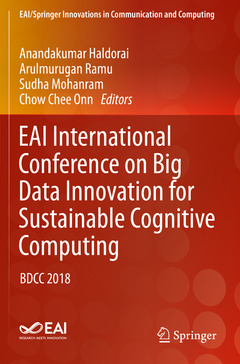EAI International Conference on Big Data Innovation for Sustainable Cognitive Computing, 1st ed. 2020 BDCC 2018 EAI/Springer Innovations in Communication and Computing Series

This proceeding features papers discussing big data innovation for sustainable cognitive computing. The papers feature detail on cognitive computing and its self-learning systems that use data mining, pattern recognition and natural language processing (NLP) to mirror the way the human brain works. This international conference focuses on cognitive computing technologies, from knowledge representation techniques and natural language processing algorithms to dynamic learning approaches. Topics covered include Data Science for Cognitive Analysis, Real-Time Ubiquitous Data Science, Platform for Privacy Preserving Data Science, and Internet-Based Cognitive Platform. The EAI International Conference on Big Data Innovation for Sustainable Cognitive Computing (BDCC 2018), took place on 13 ? 15 December 2018 in Coimbatore, India.
Chapter 1. Data Security In The Cloud Via Artificial Intelligence With Vector Quantization For Image Compression.- Chapter 2. Hybrid Ant-Fuzzy Approach For Data Clustering (Afc) In Distributed.- Chapter 3. S-Transform Based Efficient Copy-Move Forgery Detection Technique In Digital Images.- Chapter 4. Neuro Fuzzy Ant Bee Colony Based Feature Selection For Cancer Classification.- Chapter 5. Entity Resolution For Maintaining Electronic Medical Record Using Oyster.- Chapter 6. Lifetime Improvement Of Wireless Sensor Networks Using Tree Based Routing Protocol.- Chapter 7. An Energy-Efficient Distributed Unequal Clustering Approach For Lifetime Maximization In Wireless Sensor Network.- Chapter 8. An Effective Big-Data And Blockchain [Bd-Bc] Based Decision Support Model For Sustainable Agriculture System.- Chapter 9. An Sdn Based Strategy For Reliable Data Transmission In Mobile Wireless Sensor Networks.- Chapter 10. Different Aspects Of 5G Wireless Network - An Overview.- Chapter 11. Intelligent Systems For Volumetric Feature Recognition From Cad Mesh Models.- Chapter 12. Factors Affecting A Mobile Learning System: A Case Study.- Chapter 13. Document Similarity Approach Using Grammatical Linkages With Graph Databases.- Chapter 14. Missing Data Handling By Mean Imputation And Statistical Analysis.- Chapter 15. Task Identification System For Elderly Paralysed Patients Using Electrooculography And Neural Networks.- Chapter 16. Software Defined Networking (Sdn) Architecture For Smart Trashcan Using Iot.- Chapter 17. Modified K- Nearest Neighbour Fuzzy Classifier Using Group Prototypes And Its Application To Skin Segmentation.- Chapter 18. Enhancing Cooperative Spectrum Sensing In Flying Cell Towers For Disaster Management Using Convolutional Neural Networks.- Chapter 19. Emoticons And Their Effects On Sentiment Analysis Of Twitter Data.- Chapter 20. Prediction Of Customer Churn Using Machine Learning.- Chapter 21. Prediction Of Crop Yield Using Fuzzy-Neural System.- Chapter 22. Speed Estimation And Detection Of Moving Vehicles Based On Probabilistic Principal Component Analysis And New Digital Image Processing Approach.- Chapter 23. A Posture Recognition System For Assisted Self-Learning Of Yoga By Cognitive Impaired Older People For The Prevention Of Falls.- Chapter 24. Improved Ufhlsnn (Iufhlsnn) For Generalized Representation Of Knowledge And Its Cpu Parallel Implementation Using Openmp.- Chapter 25. Performance Evaluation Of Multihop Multibranch Df Relaying Cooperative Wireless Network.- Chapter 26. Predicting Property Prices – A Universal Model.- Chapter 27. Facial Based Human Age Estimation Using Deep Belief Network..- Chapter 28. Randomized Agent Based Model For Mobile Customer Retention Behaviour Prediction.- Chapter 29. Keyword-Based Approach For Detecting Civil Unrest Events From Online Social Media.- Chapter 30. Socioeconomic Status Classification Of Geographic Regions In Sri Lanka Through Anonymised Call Detail Records.- Chapter 31. Hand Gesture Based Human-Computer Interaction Using Arduino.- Chapter 32. An Automatic Diabetes Risk Assessment System Using Iot Cloud Platform.- Chapter 33. Message And Image Encryption Embedding Data To Gf(2M) Elliptic Curve Point For Nodes In Wireless Sensor Networks.- Chapter 34. Crack Detection In Welded Images – A Comprehensive Survey.- Chapter 35. An Effective Hybridized Classifier Integrated With Homomorphic Encryption To Enhance Big Data Security.- Chapter 36. Ai Powered Analytics App For Visualizing Accident-Prone Areas.- Chapter 37. Iot Based Autonomous Inventory Management For Warehouses.- Chapter 38. Internal Repeats Of Human Organs On Cloud.- Chapter 39. Bitcoin Prediction And Timeseries Analysis.- Chapter 40. Smart Active Helmet.
Dr. Anandakumar Haldorai, Professor (Associate) and Research Head in Department of Computer Science and Engineering, Sri Eshwar College of Engineering, Coimbatore, Tamilnadu, India. He has received his Master’s in Software Engineering from PSG College of Technology, Coimbatore and PhD in Information and Communication Engineering from PSG College of Technology under, Anna University, Chennai. His research areas include Big Data, Cognitive Radio Networks, Mobile Communications and Networking Protocols. He has authored more than 82 research papers in reputed International Journals and IEEE conferences. He has authored 7 books and many book chapters with reputed publishers such as Springer and IGI. He is editor of Inderscience IJISC and served as a reviewer for IEEE, IET, Springer, Inderscience and Elsevier journals. He is also the guest editor of many journals with Elsevier, Springer, Inderscience, etc. He has been the General Chair, Session Chair, and Panelist in several conferences. He is senior member of IEEE, IET, ACM and EAI research group.
Dr. Arulmurugan Ramu is a Professor, Department of Computer Science and Engineering, Presidency University, Bangalore, India. His research focuses on the automatic interpretation of images and related problems in machine learning and optimization. Arulmurugan’s main research interest is in vision, particularly high-level visual recognition. In computer vision, Arulmurugan’s interests include image and video classification, understanding and retrieval. Some of the most recent work in his lab relates to fundamental technological problems related to large-scale data, machine learning and artificial intelligence. He is author of more than 25 papers in major computer vision and machine learning conferences and journals. From 2011 to 2015 he was researcher fellow at the Anna University. He is the recipient of the PhD degrees in Information and Communication Engineering from the Anna University at Chennai in 20
Date de parution : 10-2020
Ouvrage de 412 p.
15.5x23.5 cm
Date de parution : 10-2019
Ouvrage de 412 p.
15.5x23.5 cm
Disponible chez l'éditeur (délai d'approvisionnement : 15 jours).
Prix indicatif 158,24 €
Ajouter au panier


